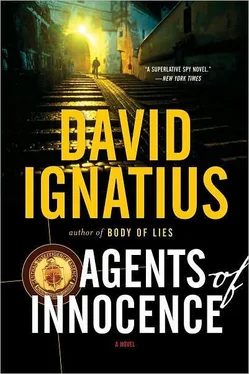David Ignatius - Agents of Innocence
Здесь есть возможность читать онлайн «David Ignatius - Agents of Innocence» весь текст электронной книги совершенно бесплатно (целиком полную версию без сокращений). В некоторых случаях можно слушать аудио, скачать через торрент в формате fb2 и присутствует краткое содержание. Жанр: Шпионский детектив, на английском языке. Описание произведения, (предисловие) а так же отзывы посетителей доступны на портале библиотеки ЛибКат.
- Название:Agents of Innocence
- Автор:
- Жанр:
- Год:неизвестен
- ISBN:нет данных
- Рейтинг книги:3 / 5. Голосов: 1
-
Избранное:Добавить в избранное
- Отзывы:
-
Ваша оценка:
- 60
- 1
- 2
- 3
- 4
- 5
Agents of Innocence: краткое содержание, описание и аннотация
Предлагаем к чтению аннотацию, описание, краткое содержание или предисловие (зависит от того, что написал сам автор книги «Agents of Innocence»). Если вы не нашли необходимую информацию о книге — напишите в комментариях, мы постараемся отыскать её.
Agents of Innocence — читать онлайн бесплатно полную книгу (весь текст) целиком
Ниже представлен текст книги, разбитый по страницам. Система сохранения места последней прочитанной страницы, позволяет с удобством читать онлайн бесплатно книгу «Agents of Innocence», без необходимости каждый раз заново искать на чём Вы остановились. Поставьте закладку, и сможете в любой момент перейти на страницу, на которой закончили чтение.
Интервал:
Закладка:
She gave a slight laugh that was, at once, a protest of modesty and a further seduction.
“Goodbye,” said Rogers.
He looked at the phone fondly, a last remnant of the woman, before hanging it up.
“C’est dommage,” Rogers said to the headwaiter as he returned to his seat. The waiter smiled indulgently.
Rogers ordered medallions of venison with chestnut puree, a house specialty. After drinking down most of a bottle of Burgundy, he wondered if perhaps there was an angel in heaven with the task of keeping him faithful to his wife, despite his own flights of desire. He tried to remember the priest’s admonition in school long ago. Was the adulterous wish the same in the eyes of God as the act itself? Surely not. But he couldn’t quite remember. Perhaps he was getting old.
A shuttle bus arrived at the hotel at 9:00 A.M. It had smoked windows, so that any KGB agents who happened to be cruising along the George Washington Parkway couldn’t be sure just who was taking the exit for the Central Intelligence Agency. The bus deposited Rogers in the basement of the building. He passed through security and took the elevator to the wing where the DDP and his minions planned their global escapades. A secretary in a distant outer office welcomed Rogers, gave him coffee, and took him down the hall.
The agency’s headquarters looked so clean and wholesome. Someone had once told Rogers that it had been designed to look like a university campus. A place where people smoked pipes and went to seminars. How distant that image was, Rogers thought, from the world that he inhabited.
“The problem with your operational plan is that there isn’t any plan,” said John Marsh.
Rogers listened impassively. He was seated in a conference room with Marsh and Stone. The room was decorated with photographs of past heads of the clandestine service. A gallery of chiselled features, measured judgments, stiff upper lips.
“I had thought these issues were resolved a month ago, only to find that they were not,” continued Marsh.
Marsh made an interesting contrast to Rogers. He was shorter, neater, tighter, meaner. Where Rogers looked relaxed and informal in his corduroy suit, Marsh was dressed fastidiously, like a salesman at a Brooks Brothers store. He wore a blue pinstripe suit, a white shirt with a button-down collar that rolled just so, a yellow tie, striped suspenders, and a pair of black tasseled mocassins. His hair was combed back tightly against his head. If someone had told Marsh that his head looked as smooth and hard as a bullet, he probably would have felt flattered.
“At the risk of sounding immodest,” Marsh went on, “I must point out that the central problem in the PRQ is the same one that I tried to bring to Tom’s attention in the cable to him in Kuwait. Which was, shall we say, mislaid.” He chided Rogers in the curt, bloodless way that a schoolteacher corrects a dull pupil.
“It shouldn’t be necessary to remind someone of Tom’s experience and standing…”
Rogers noted that he was being discussed in the third person. He had a momentary desire to punch Marsh in the face.
“…that the essence of any successful intelligence operation is control.
“An uncontrolled agent is like an unguided missile,” continued Marsh. “We have no hook, no handle, to manipulate his behavior. The uncontrolled agent can go running off in whatever direction he pleases, talk to whomever he likes, do or not do what we request-as it suits his fancy. In my opinion it’s better not to deal with such a person at all, regardless of how well placed he may be, because the potential for mischief is so great. I regard it as essential, especially in an organization like Fatah that is already thoroughly penetrated by the Soviets, that we work only with people who are under discipline.”
As he finished his discourse, Marsh took a white linen handkerchief from his breast pocket and dabbed it against his mouth. Rogers decided he had been right in a judgment he made several years ago: Marsh was a pompous ass.
Rogers offered a brief defense of his recommendations in the PECOCK case, repeating the same arguments he had made in the PRQ. He spoke calmly and carefully, trying to sound like himself and not a misshapen version of Marsh.
“Control would certainly be preferable,” said Rogers, “if it were possible. But I don’t think it is in this case. At least not yet. We’re dealing with someone at the top of his organization, who believes in his cause. He isn’t a defector. He isn’t a crook. He isn’t a pervert. If we want control, we should go after somebody who is less important and more vulnerable. Somebody who will be more susceptible to pressure.”
“That’s defeatism,” said Marsh. “You are assuming you can’t recruit the agent through financial incentives when, by your own admission, you haven’t really tried.”
You fool, thought Rogers. You wouldn’t know a potential agent if he walked up and bit you on the ass.
Rogers turned to Stone.
“All I can do is ask you to trust me,” Rogers said. “That may sound unprofessional. But I know this case, and I know what will work with this agent, and I hope you’ll trust my judgment.”
Stone, who had been listening silently to the two younger men, eventually spoke up.
“This isn’t an easy case,” the division chief said. “We all have an enormous regard for Tom’s work, and we also have a pressing need for the intelligence he can provide about the Palestinians. But our need isn’t so pressing that it makes sense for us to launch an insecure operation.”
Marsh nodded.
“I want to take a day or so to consider the issues that we have discussed and talk to a few people who are wiser than I am,” concluded Stone. “I’ll let you know my decision as quickly as possible.”
The meeting ended.
Stone asked Rogers to stay behind a moment.
As Marsh walked out of the conference room, he could hear the division chief inviting Rogers to join him for dinner that night at his club.
Dinner with Stone was a ritual, born of his early days in the officers’ mess of the prewar Army, nurtured in London during the war, sustained in the years since then at dinner meetings around the world with agents, case officers, and friends. Stone regarded dinner as a play in three acts and liked each detail of the production-each dish, drink, and morsel of conversation-to be precisely right.
Rogers arrived at the Athenian Club promptly at seven-thirty. It was a brick building in downtown Washington, squat and solid like a broad-beamed Victorian banker.
“Can I help you?” said the doorman, discreetly stopping Rogers at the foyer. The doorman had memorized several thousand faces. He knew everyone who was a member. More important, he knew everyone who was not, and each person in this latter category was greeted with the same polite but firm query: “Can I help you?” The doorman in this case helped Rogers to the lobby, where Stone was seated in a leather chair by the fire, reading a newspaper.
Stone rose and escorted his guest up a grand stairway to the drawing room on the second floor, where another fire was blazing and two big leather chairs awaited them. An old black waiter in a white coat arrived and took their drink orders.
“A dry gin martini,” said Stone.
Rogers, swept along by the tide of the encounter, ordered the same. They made small talk for forty-five minutes, talking about their respective families, current events, low-level agency gossip.
A waiter brought menus and both men ordered steaks. Stone selected a bottle of Bordeaux from the wine list. At eight-fifteen exactly, the older man rose from his chair and led his guest to the fourth-floor dining room, past acres of starched white linen, to a corner table. Dinner conversation was slightly more focused, touching on events in the Middle East, life in the Beirut station, the agency’s ups and downs.
Читать дальшеИнтервал:
Закладка:
Похожие книги на «Agents of Innocence»
Представляем Вашему вниманию похожие книги на «Agents of Innocence» списком для выбора. Мы отобрали схожую по названию и смыслу литературу в надежде предоставить читателям больше вариантов отыскать новые, интересные, ещё непрочитанные произведения.
Обсуждение, отзывы о книге «Agents of Innocence» и просто собственные мнения читателей. Оставьте ваши комментарии, напишите, что Вы думаете о произведении, его смысле или главных героях. Укажите что конкретно понравилось, а что нет, и почему Вы так считаете.












